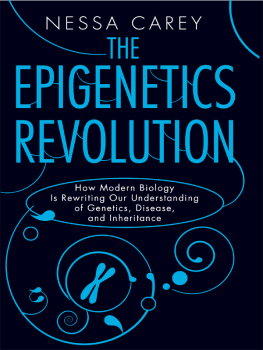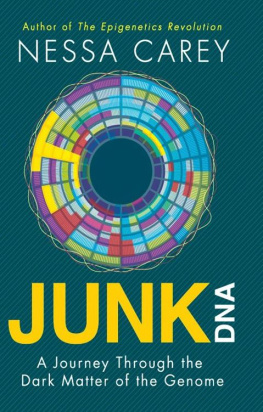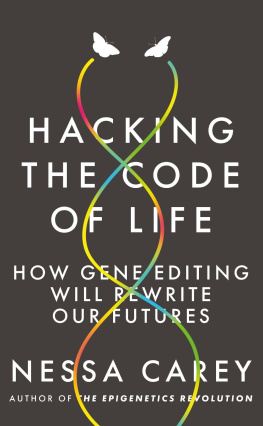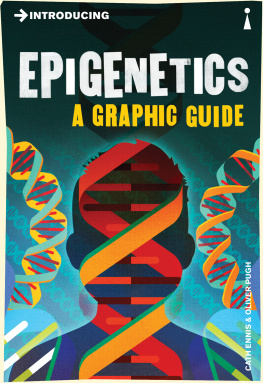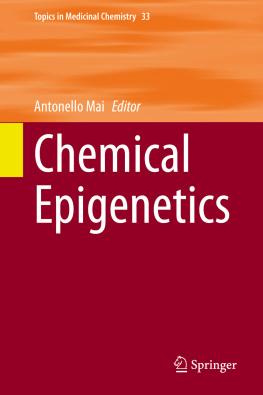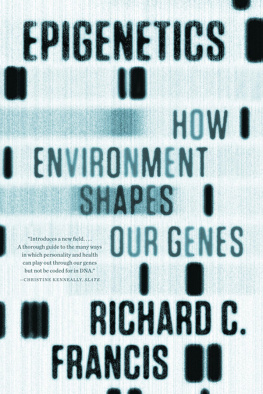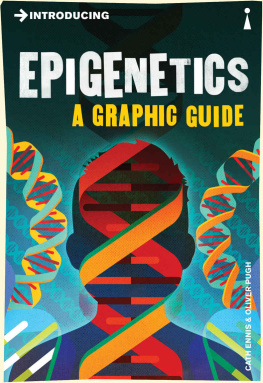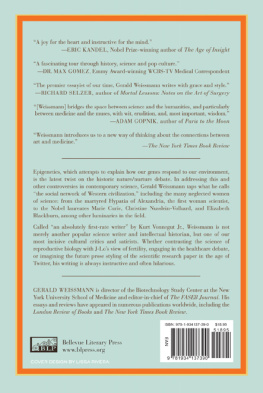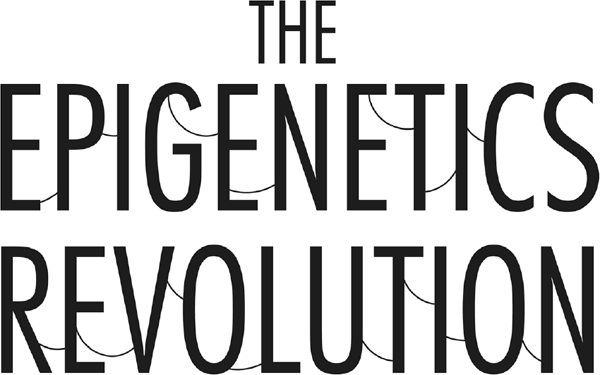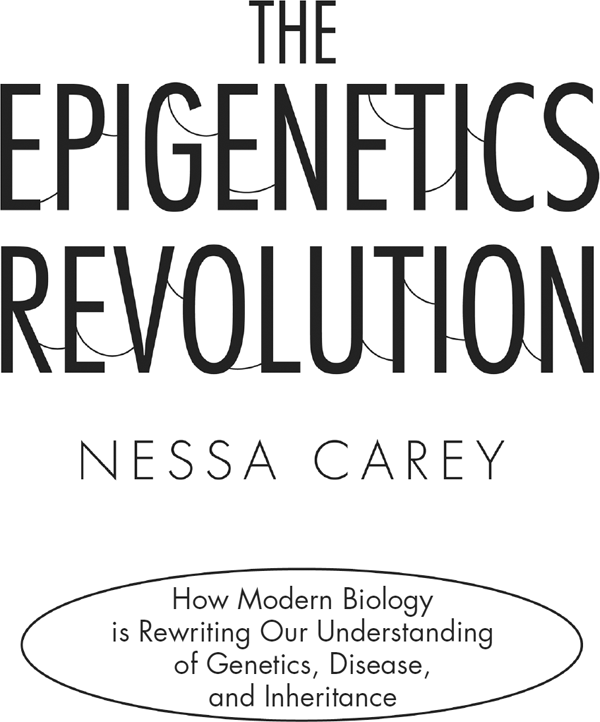COLUMBIA UNIVERSITY PRESS
New York
COLUMBIA UNIVERSITY PRESS
Publishers Since 1893
New York Chichester, West Sussex
cup.columbia.edu
Copyright 2012 Nessa Carey
All rights reserved
E-ISBN 978-0-231-53071-2
Library of Congress Cataloging-in-Publication Data
Carey, Nessa
The epigenetics revolution: how modern biology is
rewriting our understanding of genetics, disease, and
inheritance/Nessa Carey.
p. ; cm.
Includes bibliographical references and index.
ISBN 978-0-231-16116-9 (cloth: alk. paper)
I. Title
[DNLM: 1. Epigenesis, Genetic. 2. Epigenomics.
3. Evolution, Mollecular. QU 475]
616.042dc23
2011041032
A Columbia University Press E-book.
CUP would be pleased to hear about your reading experience with this e-book at .
References to Internet Web sites (URLs) were accurate at the time of writing. Neither the author nor Columbia University Press is responsible for URLs that may have expired or changed since the manuscript was prepared.
For Abi Reynolds, who reprogrammed my life
And in memory of Sean Carey, 1925 to 2011
Contents
Over the last few years, Ive had the privilege of working with some truly amazing scientists. There are too many to name here but special acknowledgements must go to Michelle Barton, Stephan Beck, Mark Bedford, Shelley Berger, Adrian Bird, Chris Boshoff, Sharon Dent, Didier Devys, Luciano Di Croce, Anne Ferguson-Smith, Jean-Pierre Issa, Peter Jones, Bob Kingston, Tony Kouzarides, Peter Laird, Jeannie Lee, Danesh Moazed, Steve McMahon, Wolf Reik, Ramin Shiekhattar, Irina Stancheva, Azim Surani, Laszlo Tora, Bryan Turner, and Patrick Varga-Weisz.
Thanks go also to my former colleagues at CellCentric Jonathan Best, Devanand Crease, Tim Fell, David Knowles, Neil Pegg, Thea Stanway, and Will West.
As a first-time author I owe major gratitude to my agent, Andrew Lownie, for taking a risk on me and on this book.
Major thanks also to the lovely people at my publishers. Ive had terrific support from the folks at Columbia University Press, particularly Patrick Fitzgerald, Bridget Flannery-McCoy, Jim Jordan, and Jennifer Jerome. At Icon in the UK, Id like to thank Simon Flynn, Najma Finlay, Andrew Furlow, Nick Halliday, Henry Lord, and Harry Scoble. Their unfailing patience with my complete ignorance of all aspects of publishing has been heroic.
Ive had great support from family and friends and I hope theyll forgive me for not mentioning them all by name. But for sheer entertainment and distraction during some stressy patches I have to thank Eleanor Flowerday, Willem Flowerday, Alex Gibbs, Ella Gibbs, Jessica Shayle OToole, Lili Sutton, and Luke Sutton.
And for always resisting the temptation to roll her eyes every time I said, I cant meet friends/do the dishes/go away for the weekend because Im working on my book, Ive got to thank my lovely partner Abi Reynolds. I promise Ill take that ballroom dancing lesson now.
DNA.
Sometimes, when we read about biology, we could be forgiven for thinking that those three letters explain everything. Here, for example, are just a few of the statements made on 26 June 2000, when researchers announced that the human genome had been sequenced:
Today we are learning the language in which God created life.
US President Bill Clinton
We now have the possibility of achieving all we ever hoped for from medicine.
UK Science Minister Lord Sainsbury
Mapping the human genome has been compared with putting a man on the moon, but I believe it is more than that. This is the outstanding achievement not only of our lifetime, but in terms of human history.
Michael Dexter, The Wellcome Trust
From these quotations, and many others like them, we might well think that researchers could have relaxed a bit after June 2000 because most human health and disease problems could now be sorted out really easily. After all, we had the blueprint for humankind. All we needed to do was get a bit better at understanding this set of instructions, so we could fill in a few details.
Unfortunately, these statements have proved at best premature. The reality is rather different.
We talk about DNA as if its a template, like a mould for a car part in a factory. In the factory, molten metal or plastic gets poured into the mould thousands of times and, unless something goes wrong in the process, out pop thousands of identical car parts.
But DNA isnt really like that. Its more like a script. Think of Romeo and Juliet, for example. In 1936 George Cukor directed Leslie Howard and Norma Shearer in a film version. Sixty years later Baz Luhrmann directed Leonardo DiCaprio and Claire Danes in another movie version of this play. Both productions used Shakespeares script, yet the two movies are entirely different. Identical starting points, different outcomes.
Thats what happens when cells read the genetic code thats in DNA. The same script can result in different productions. The implications of this for human health are very wide-ranging, as we will see from the case studies we are going to look at in a moment. In all these case studies its really important to remember that nothing happened to the DNA blueprint of the people in these case studies. Their DNA didnt change (mutate), and yet their life histories altered irrevocably in response to their environments.
Audrey Hepburn was one of the 20th centurys greatest movie stars. Stylish, elegant and with a delicately lovely, almost fragile bone structure, her role as Holly Golightly in Breakfast at Tiffanys has made her an icon, even to those who have never seen the movie. Its startling to think that this wonderful beauty was created by terrible hardship. Audrey Hepburn was a survivor of an event in the Second World War known as the Dutch Hunger Winter. This ended when she was sixteen years old but the aftereffects of this period, including poor physical health, stayed with her for the rest of her life.
The Dutch Hunger Winter lasted from the start of November 1944 to the late spring of 1945. This was a bitterly cold period in Western Europe, creating further hardship in a continent that had been devastated by four years of brutal war. Nowhere was this worse than in the Western Netherlands, which at this stage was still under German control. A German blockade resulted in a catastrophic drop in the availability of food to the Dutch population. At one point the population was trying to survive on only about 30 per cent of the normal daily calorie intake. People ate grass and tulip bulbs, and burned every scrap of furniture they could get their hands on, in a desperate effort to stay alive. Over 20,000 people had died by the time food supplies were restored in May 1945.
The dreadful privations of this time also created a remarkable scientific study population. The Dutch survivors were a well-defined group of individuals all of whom suffered just one period of malnutrition, all of them at exactly the same time. Because of the excellent healthcare infrastructure and record-keeping in the Netherlands, epidemiologists have been able to follow the long-term effects of the famine. Their findings were completely unexpected.
One of the first aspects they studied was the effect of the famine on the birth weights of children who had been in the womb during that terrible period. If a mother was well-fed around the time of conception and malnourished only for the last few months of the pregnancy, her baby was likely to be born small. If, on the other hand, the mother suffered malnutrition for the first three months of the pregnancy only (because the baby was conceived towards the end of this terrible episode), but then was well-fed, she was likely to have a baby with a normal body weight. The foetus caught up in body weight.

